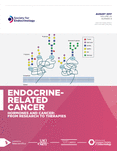E2F1-mediated human POMC expression in ectopic Cushing’s syndrome
- Takako Araki*,
- Ning-Ai Liu*,
- Yukiko Tone,
- Daniel Cuevas-Ramos,
- Roy Heltsley,
- Masahide Tone and
- Shlomo Melmed⇑
- Correspondence should be addressed to S Melmed; Email: melmed{at}csmc.edu
Abstract
Cushing’s syndrome is caused by excessive adrenocorticotropic hormone (ACTH) secretion derived from pituitary corticotroph tumors (Cushing disease) or from non-pituitary tumors (ectopic Cushing’s syndrome). Hypercortisolemic features of ectopic Cushing’s syndrome are severe, and no definitive treatment for paraneoplastic ACTH excess is available. We aimed to identify subcellular therapeutic targets by elucidating transcriptional regulation of the human ACTH precursor POMC (proopiomelanocortin) and ACTH production in non-pituitary tumor cells and in cell lines derived from patients with ectopic Cushing’s syndrome. We show that ectopic hPOMC transcription proceeds independently of pituitary-specific Tpit/Pitx1 and demonstrate a novel E2F1-mediated transcriptional mechanism regulating hPOMC. We identify an E2F1 cluster binding to the proximal hPOMC promoter region (−42 to +68), with DNA-binding activity determined by the phosphorylation at Ser-337. hPOMC mRNA expression in cancer cells was upregulated (up to 40-fold) by the co-expression of E2F1 and its heterodimer partner DP1. Direct and indirect inhibitors of E2F1 activity suppressed hPOMC gene expression and ACTH by modifying E2F1 DNA-binding activity in ectopic Cushing’s cell lines and primary tumor cells, and also suppressed paraneoplastic ACTH and cortisol levels in xenografted mice. E2F1-mediated hPOMC transcription is a potential target for suppressing ACTH production in ectopic Cushing’s syndrome.
- Received 27 August 2016
- Accepted 5 September 2016
- Made available online as an Accepted Preprint 7 October 2016
- © 2016 Society for Endocrinology












